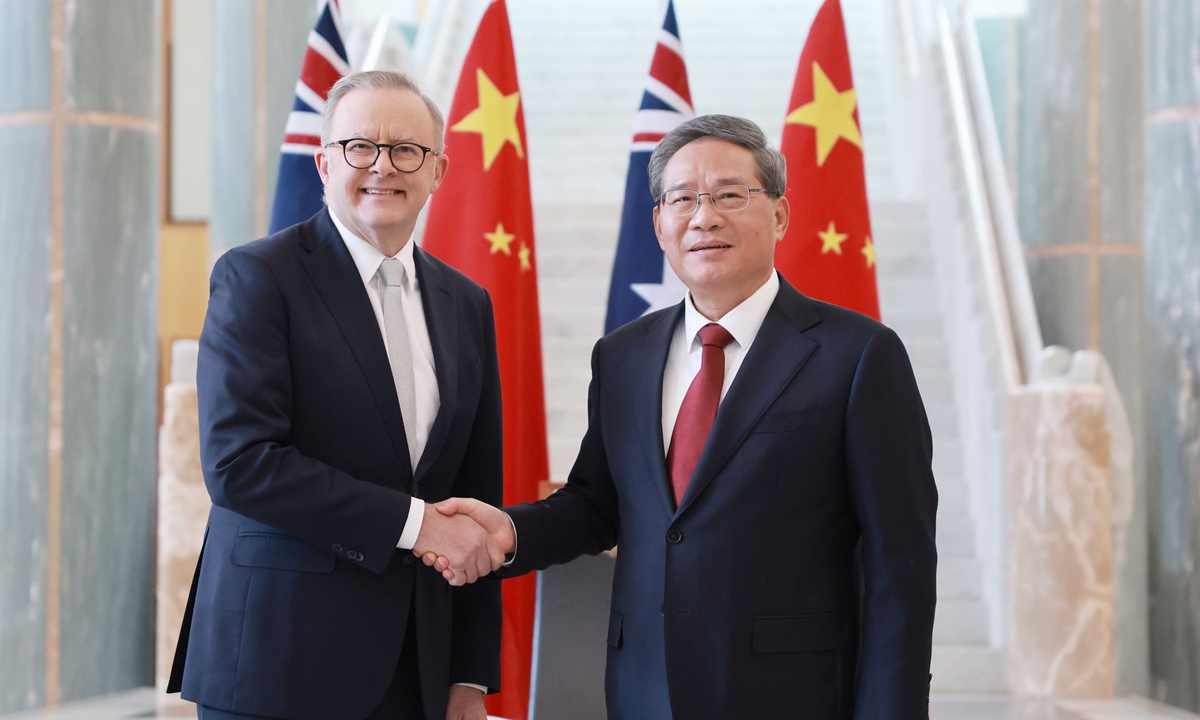2024年6月17日,华东师范大学澳大利亚研究中心主任陈弘接受《环球时报》英文版采访,谈李强总理访问澳大利亚成果。
Premier Li meets Albanese; 'visit shows China’s sincerity in improving ties with Australia'

Chinese Premier Li Qiang and Australian Prime Minister Anthony Albanese shake hands at the ninth China-Australia Annual Leaders' Meeting in Canberra, Australia, on June 17, 2024. Photo: Xinhua
Chinese Premier Li Qiang said Monday that China is ready to work with Australia to build a more mature, stable and fruitful China-Australia comprehensive strategic partnership to better benefit the two peoples. Li also announced on Monday that China will include Australia on the list of unilateral visa-free countries.
The premier's visit to Australia has showcased China's sincerity in improving ties with Australia, and it is hoped that Australia will meet China halfway to allow for the evolution of bilateral relations and increased cooperation, said observers.
Looking back at the development of China-Australia relations over the past decade, the most important experience and inspiration is to uphold mutual respect and mutually beneficial cooperation, and seek common ground while shelving differences, Li said.
Li made the remarks during the ninth China-Australia Annual Leaders' Meeting with Australian Prime Minister Anthony Albanese.
Since Prime Minister Albanese's visit to China last November, China and Australia have further restored and developed dialogues and cooperation in various fields, achieving a comprehensive turnaround in bilateral relations, Li said.
He said China is willing to work with Australia to maintain and develop the current hard-won positive momentum of bilateral relations.
Li also expressed the hope that the Australian side can provide a fair, just and non-discriminatory business environment for Chinese enterprises, and provide more convenience for personnel exchanges between the two sides.
China is willing to enhance coordination and cooperation with Australia at regional and international levels, oppose bloc confrontation and a "new Cold War" from the perspective of maintaining regional peace and stability, adhere to openness, inclusiveness and common development, and work together to advance regional economic integration and build an open world economy, Li said.
China is willing to stick to its comprehensive strategic partnership with Australia, give full play to the China-Australia Strategic Economic Dialogue and other mechanisms, continuously boost trade, actively expand cooperation in new energy vehicles, renewable energy power generation and other fields, and strengthen sub-national, cultural and tourism exchanges and cooperation, he said.
Li said on Monday that China will include Australia in the list of unilateral visa-free countries.
Albanese said that Australia is pleased to see that current Australia-China relations are stabilizing and improving. Australia adheres to the one-China policy and does not support "Taiwan independence."
A Statement on Joint Outcomes of the China-Australia Annual Leaders' Meeting was released on Monday. It reaffirmed mutual respect, equality, mutual benefit, stable development and Australia's commitment to the one-China policy. They agreed to continue to grow the bilateral relationship and uphold their respective national interests. They also agreed that both sides would continue to navigate their differences wisely.
More than stabilizing
The joint statement acknowledged the importance of regular engagement between leaders, ministers and officials on both sides in support of the ongoing stabilization and development of the bilateral relationship. They confirmed plans to resume the Strategic Economic Dialogue in 2024.
The dialogue China's Ministry of Foreign Affairs spokesperson said the truth is that an Australian military aircraft deliberately flew within close range of China's airspace in a provocative move that endangered China's maritime and air security in the name of enforcing UN Security Council's resolutions.
In the joint statement released on Monday, both leaders agreed to continue or expand engagement in political dialogue, including through the Defence Strategic Dialogue and Defence Coordination Dialogue, and convening an initial session of a bilateral Maritime Affairs Dialogue.
Disputes on military, human rights, South China Sea are the long-existing divergences between China and Australia, said Ning. He believes such differences will continue to exist as the US is pushing for its Asia-Pacific strategy, with Australia being the core member of all US-led small cliques in the region, including AUKUS and QUAD.
China has always opposed Australia's joining of those groups; thus how to develop relationship with China while answering to US pressure remains a difficult task for Canberra in the future, said Ning, noting that it is a positive sign that both side agreed to have dialogue on military level.
Beijing and Canberra share a common interest in defending the peace and stability of the Asia-Pacific region.Chen stated that turmoil in this region would harm the interests of both countries. Therefore, they should make joint efforts toward this goal instead of serving the interests of extraterritorial countries.